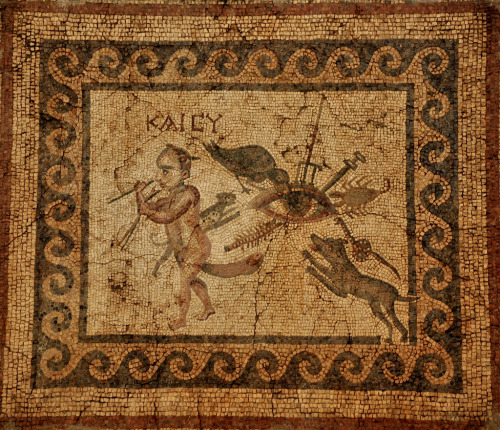[Greek] βασκαίνω (baskainō), [Latin] fascinare: to slander, to bewitch, to malign, to fascinate, to speak ill of someone, to bring evil on a person, to mislead by an evil eye, to charm, Gal.3:1

Roman Era (Early 2nd Century A.D in Antiocha) Mosaic of the Evil Eye
Background Information:
Greek Hellenism: This term means to hurt someone, to bewitch, to revile, and to envy. Witchcraft and the ‘evil eye’ were often placed on others through hostile words or looks. The ancient world was perceived as being surrounded (controlled) by invisible and hostile spirits. Greetings and letters were often enclosed with expressions such as “Heaven preserve us!” Various superstitious practices and customs developed over time to overcome these mysterious outside forces. Theocritus Idylls 6.39 states that the Greek spat for protection against the ‘Evil Eye’. Since strangers were deemed potential bearers of the ‘Evil Eye’, spitting was customary in their presence. Pliny states “When a stranger looks at an infant while asleep, it is usual for a nurse to spit three times, even though the infant is already under the divine protection of the god Fascinus.”
Old Testament: This term means to be unfavorably disposed to, to do evil, to injure, to break, to distress, to be distressed, and to be broken. Interestingly, the ‘Evil Eye’, while not explicitly stated in Old Testament scripture, is frequently found in Jewish rabbinic literature. It was also believed that having a ‘good eye’ meant having an attitude of good will and kindness toward others. In a sense, the 10th Commandment (You shall not covet against your neighbor) was created to protect against bestowing the ‘evil eye’ (covetousness) on another person. The most refined and fastidious man among you will begrudge his brother and his beloved wife and his surviving children (Deut.28:54). None is more stingy than he who is stingy with himself; he punished his own miserliness (Sir. 14:6). Please, my brothers, do not act wickedly (Gen.19:7). The matter distressed Abraham greatly because of his son (Gen.21:11). And the Egyptians treated us harshly and afflicted us (Deut.26:6). But the companion of fools will suffer harm (Prov.13:20).
New Testament: Paul refers to the Galatians as being bewitched by the Judaizers. The Judaizers were Christians who adopted Jewish customs and practices. Paul states that the Galatians were not only senseless but also stupid. Paul did not merely state an exaggerated metaphor. The Galatians were in fear of losing their salvation. It is as if the Galatians were hypnotized by an evil eye. The Galatians would have willingly yielded to these ‘magicians’ in corrupting their faith. Behind this ‘magic’ stands the power of falsehood and disbelief.
Scripture:
“O stupid Galatians! Who has bewitched you, before whose eyes Jesus Christ was publicly portrayed as crucified?” Gal.3:1
Paul feared that the Galatians were both stupid and senseless in potentially losing their salvation. The Galatians were being hypnotized by the evil eye of false doctrine.
Etymology: At first glance, it seems that the Greek baskaino is not related to the Latin fascinare. However, the Latin fascinare is derived from the Greek baskaino. In Latin, the letter “f” takes the place of the letter “b” in Greek. Also, in Greek, the letters “b” and “v” are used interchangeably. For example, the Greek taberna becomes the modern day term tavern.
Conclusion:
Fascinate, fascination
At first glance, I wouldn’t have bothered in making a posting about this term. Like many others, we are all familiar with the idea of the ‘Evil Eye’. But I never really understood the origin of this legend. It is not surprising that the world of superstitious pagans would develop this idea.
It was quite interesting to learn that the idea of the ‘Evil Eye’ was frequently mentioned in the Jewish rabbinic literature. I suppose it makes sense in that the ‘Evil Eye’, covetousness, and the 10th commandment are all tied together. ( I see what you have, therefore, I also want that.)
I think it is significant that Paul would call the Galatians stupid. Paul really believed that the Galatians were hypnotized, charmed, or seduced into believing false doctrine. Paul was concerned for the Galatians’ spiritual welfare.
I think most of us have either given or have received the proverbial ‘Evil Eye’. And this has nothing to do with evil or magic. It could be that hostile glance from your parents when you pulled your sister’s hair. (I probably would have gotten in trouble too for spitting!) Or it could the hostile glance from your supervisor when you did not update your accounting reports. We all have been down that road receiving the ‘evil eye’.
I found this term to be fascinating.—Sorry (couldn’t’ resist).
